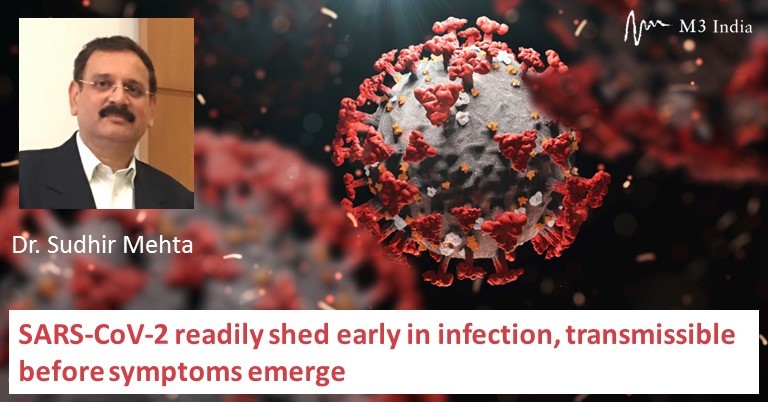Dr. Sudhir Mehta comments on a recent paper published in Nature that proves the significance of early testing and isolation of asymptomatic patients of COVID-19- a crucial step to avoid widespread community transmission.
For our comprehensive coverage and latest updates on COVID-19 click here.
 SARS-CoV-2, the virus that causes novel coronavirus disease (COVID-19), seems to be shed most readily in the upper respiratory tract early in the disease course, when symptoms are mild, according to a Nature study. And separately in MMWR, researchers report on presymptomatic transmission of SARS-CoV-2 in Singapore.
SARS-CoV-2, the virus that causes novel coronavirus disease (COVID-19), seems to be shed most readily in the upper respiratory tract early in the disease course, when symptoms are mild, according to a Nature study. And separately in MMWR, researchers report on presymptomatic transmission of SARS-CoV-2 in Singapore.
First, researchers in Germany regularly measured viral load in nasopharyngeal, sputum, and other samples from nine patients hospitalised for COVID-19. All patients were close contacts of known cases and thus presented early when symptoms were mild or prodromal; all ultimately had relatively mild clinical courses.
Overall, pharyngeal viral shedding was high during the first week of symptoms, peaking at day 4. Additionally, infectious virus was isolated from early throat samples — suggesting "active virus replication in upper respiratory tract tissues," the researchers write. Of note, infectious virus was not isolated from stool samples despite high levels of viral RNA, and urine and blood samples never tested positive for SARS-CoV-2.
Next, researchers identified seven COVID-19 clusters in Singapore in which a COVID-19 patient likely transmitted SARS-CoV-2 before experiencing symptoms. Presymptomatic transmission occurred roughly 1 to 3 days before symptom onset. Overall, 10 of 157 locally acquired cases in Singapore were attributed to presymptomatic transmission.
Dr. Sudhir Mehta's message
It is of utmost priority to detect asymptomatic COVID patients in the community especially in hotspots who have a history of contact with COVID patient or significant travel history. We must expand rapid testing strategy into the community in hotspots to detect and isolate asymptomatic COVID before an explosion occurs in India.
